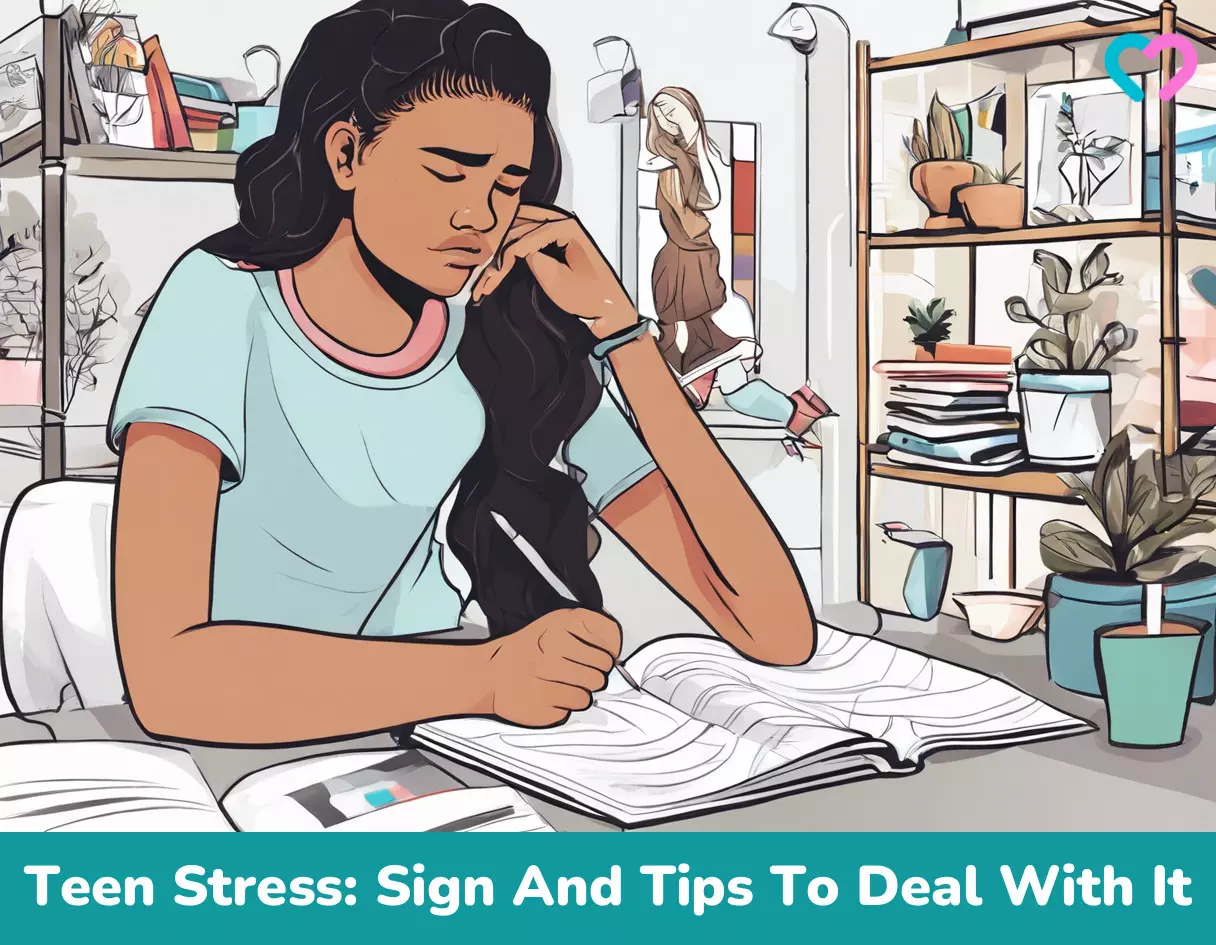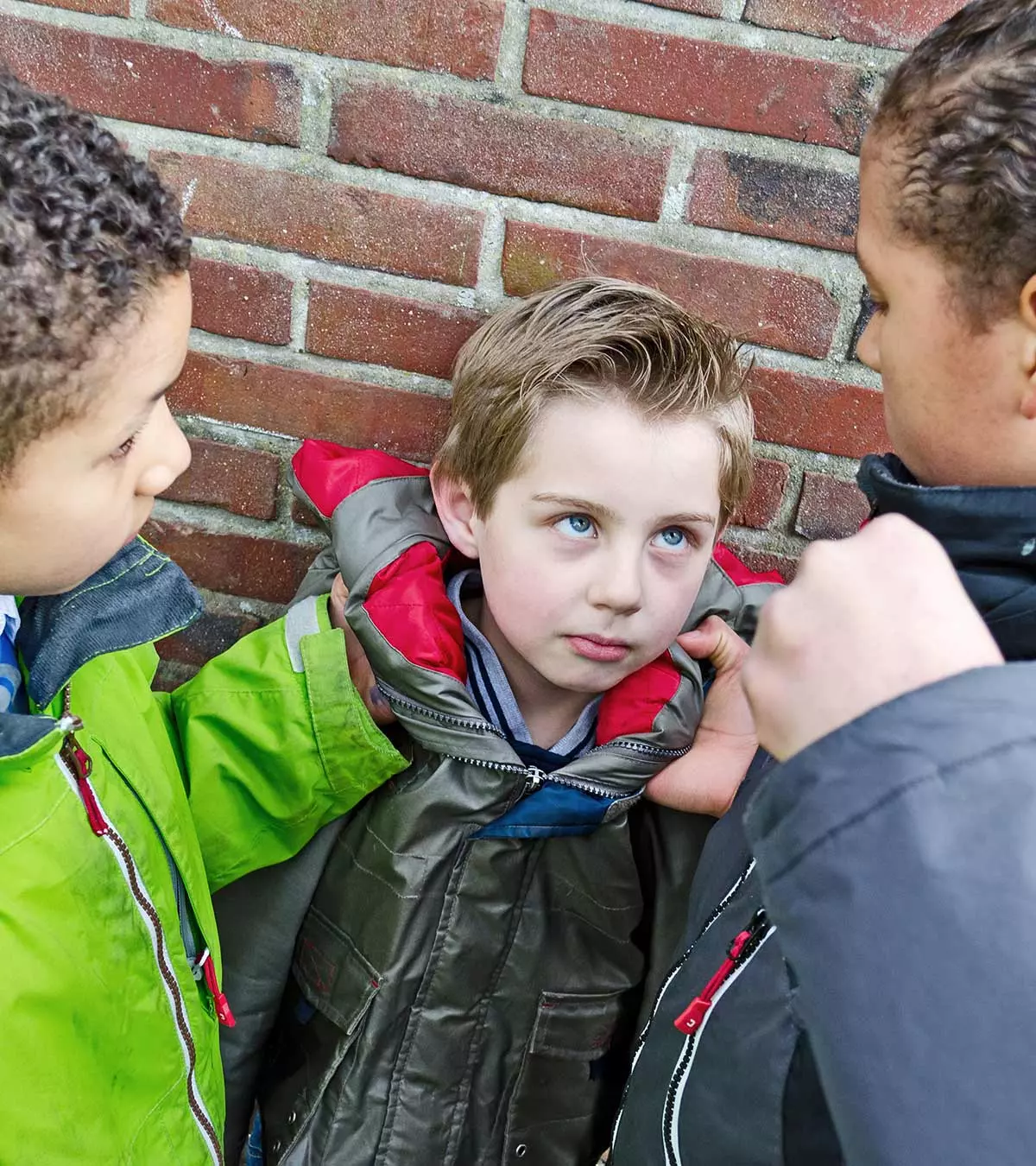
Image: Shutterstock
According to a 2014 survey by the American Psychological Association (APA), teens are found to be more stressed than adults, which is concerning for parents (1). Teenage stress symptoms vary depending on the source of stress, and while there are several causes of stress in adolescence, they may all be managed with a little patience on the part of parents.

Teenage stress is typical, but it can and should be addressed before it worsens. This post can help you understand how to manage stress in teens.
Key Pointers
- Teenagers are more stressed than adults according to a 2014 survey by the American Psychological Association (APA).
- Emotional, physical, cognitive, and behavioral cues can indicate stress in teenagers.
- Academic pressure, bodily changes, relationship problems with family or friends, trauma, or low self-esteem can be reasons for stress in teenagers.
- Coping strategies include sufficient sleep, maintaining a healthy diet, exercising regularly, seeking support from family, and talking about stress.
- Teenagers can also manage stress through mindfulness practices, breathing techniques, playing silent ball, and co-sharing.
Teen Stress – What Is It?
Imagine this.
Your daughter/son has an important exam in which he or she has to score nothing less than an A. They have exactly a week to prepare for it. Through the week, your teen, and maybe you, are likely to experience anxiety, worry, increased heart rate, irritability, anger and more. Just before the exam, your kid may even have this ‘butterflies in the stomach’ feeling. She is so scared she’ll fail that she wants to run away and hide – anything but take that test!
That is an example of stress.
Stress is how the body responds to demanding or threatening experiences. You feel stressed when you are under pressure to do something or when you have to deal with an adverse situation. Stress also activates the ‘fight or flight’ response.
 Experts say
Experts sayFlight Or Fight Response And Teens
When a person is facing a perceived or imminent threat or is extremely stressed, the automatic ‘flight or fight’ response is triggered. This response plays a vital role in how we deal with stress: it prepares the body to either fight the threat or flee from it.
When the flight or fight mode is activated, the amygdala (neurons in the brain) sends a distress signal to the hypothalamus, which is the communication center of the brain. The hypothalamus sends a response to the adrenal glands through the autonomic nervous system, activating the sympathetic nervous system (2).
The adrenal glands suddenly release adrenaline into the blood, which, in turn, releases blood sugar, sending energy to all parts of the body. When this happens, the individual’s heart rate increases, pupils dilate, the body starts to shake, and the skin is flushed or becomes pale. The person stays in this state for 20 to 60 minutes, before coming back to a normal, relaxed state.
Teenagers experience this response to stress as adults do, and it is normal as long as the response doesn’t extend to long periods. Small doses of the ‘flight-and-fight’ response are essential and helpful. That response is what helps you duck in time from getting hit by a ball or move out of the way of an oncoming vehicle just in time!
Keep reading to know how to identify if the teenager is stressed.
Signs Of Teen Stress

Stress can manifest itself in different ways, mostly emotional and physical. You can also tell that someone is stressed by the way they are behaving. The effects of stress on teens can be many; some of them are listed below.
1. Emotional signs
People who are stressed aren’t the most excited lot. Instead, they seem unhappy and may exhibit signs of depression. The US CDC’s Youth Risk Behavior Survey Data Summary & Trends Report: 2011-2025 highlights that over 42% of high school students in the US feel persistently hopeless or sad, and nearly 29% show signs of poor mental health.
Stressed teens may also seem agitated, anxious, aloof, and irritable. They get angry and overwhelmed easily by simple things, and may also feel helpless and hopeless about the situation. The next time your teenager snaps at you for no reason, you could know that he is stressed.
2. Physical signs
Physical signs of stress in teens include tiredness or fatigue, headaches, constipation, nausea and dizziness, palpitations, and loss of appetite. Your teen may lose interest in sports and other physical activities as well. Some teens may lose or gain weight, while girls may experience a change in their period cycle.
3. Behavioral changes
Your teen may also seem fidgety and display nervous habits like nail biting, restless pacing, moving around constantly and so on. Crying, isolating oneself from friends and family, being moody or easily irritable, not bothering about their appearance, and not showing as much interest in activities that give them pleasure could also indicate stress.
4. Cognitive symptoms
Stress in teens can also impact their cognitive abilities like memory.
You may think that your teen is neglecting his chores or being careless, but for all you know, he may have been stressed and forgot about it. Other cognitive symptoms include being irrational, the inability to focus, negative perspective, and poor judgment.
Sometimes, you may not be able to identify if your teenager is stressed or is just being a ‘teen’. In such cases, a teen stress test could be a good option. You could get them to take an online test or take one at school. Do not force them to take such tests and do not single them out. Instead, make it a fun activity that everyone in the family participates in.
Unlike what you may think, stress is good if it motivates you to perform better (3). It can also help you identify an underlying problem. Mental stress or tension that your teen is going through can be managed easily, only if you know what is causing it.
11 Causes Of Teen Stress

Research done by After School asked the participant teenagers in the US, what stressed them the most. About 27% of them said it was relationships while 24.5% showed teachers as the cause of their stress. At 4%, friends also formed a reason for teenagers’ stress. This graph provides you with more details on it.

What stresses the teenagers the most
Source: After SchoolSo, what are the causes of stress among teenagers? More often than not, it is the everyday things that can be stressful. If your teenager is stressed, it could be because of one or more stressors listed below.
1. Academic stress
The pressure to perform better academically is one of the most common causes of high school stress. According to the 2025 Worldmetrics report, 27% of teens feel highly stressed during the school year, compared to 13% in the summer months. Moreover, the APA reports that 56% of teenagers consider homework as one of their primary stressors (4). Teenagers often worry about completing school work, projects, and reports, studying for their exams, and about which colleges they should apply to. This kind of pressure is good when it encourages your teenager to get better grades at school. But if it is affecting their cognitive abilities and taking a toll on their health, it is a concern.
2. Physical stress
Physical changes can also be a cause of stress among teenagers. Adolescents go through some emotional and physical changes which can leave them confused and stressed. Not knowing what is happening to their body and why they feel a certain way during puberty can be a cause of such tension. Also, excessive strain on the body can leave your teen tired and mentally stressed.
3. Social stress
Social life is paramount for teenagers, and they could have a persistent need to be accepted by their peers by being in the popular ‘groups’, attending parties and hanging out with their friends. They could give more importance to friends than family.
Peer pressure is a social stressor, where teenagers have a need to be accepted by their peers and are motivated to try new things such as drinking, smoking, and doing drugs. They are under constant pressure to dress in a certain way, speak the teen lingo and be ‘cool’. More often than not, all this implies that teenagers have to put aside their true selves and pretend to be someone they are not, which can be a very stressful experience.
In that process, they create an accepted social image and are under constant pressure to maintain it. Trying to strike a balance between their image and a created one is not an easy task and can be stressful.
In addition to the above, problems with friends, bullying, and romantic relationships can also be a cause of stress among teenagers.
4. Stress due to family problems
Anything that affects the family impacts the teenager directly. Unreasonable expectations by parents, marital discord between parents, sickness of a family member, or strained relationship between siblings are all the factors that can affect a teenager.
Sibling rivalry is yet another family problem that can stress the teenager. Differences between siblings are normal, but if it goes up a few notches and turns into war, it can be stressful for both the parties involved. Teenagers may develop feelings of jealousy and hatred for their younger siblings who get more attention from the parents. Avoid taking sides with the kids to prevent such a situation.
5. Financial stress
Money isn’t something that only worries adults. Teenagers are more stressed about finances because they cannot do much about it. Studies show that kids from low-income families deal with poverty-related stress almost all the time and become troubled teens and adults (5).
If your family is going through financial problems, that can also be a stressor for your teenager. Teenagers may worry about college tuition and scholarships, which can be very stressful. While it is okay to let your teen know if you are trying to make both ends meet, do not burden them with too many details.
6. Traumatic events
Dealing with traumatic events like accidents, sickness or death of a loved one, physical or mental abuse can have a very severe impact on a teenager. Death can create a sense of loss and fear of losing everyone and everything, adding stress to the pain. Sometimes, breaking up with a romantic partner can also be traumatic for young adults. It is always a good idea to keep an eye on your teenager in the wake of any such events.
7. Drastic changes in life
Adolescents may not embrace change as quickly as adults do. Drastic changes like moving to a new school or city, the addition of new members to the family such as a step-parent, step-siblings, etc., can make the teenager uncomfortable. Not knowing how to deal with changes and the way to meet the expectations of parents or teachers can make life very stressful for the teenager.
8. Romantic relationships
Boys and girls in high school often worry about not having a boyfriend or girlfriend, when all their friends do. Expectations from the partner, getting too little or too much attention from the partner and the confusion caused due to budding sexual feelings are just a few things about romantic relationships that can get them stressed.
9. Poor self-esteem
Teenagers have a lot of questions and doubts about the different emotions and physical changes they go through. The worst among them is identity confusion caused by self-doubt or poor self-esteem. How you treat your teen can also give rise to self-doubt and poor perception of self, leading to a negative body image.
10. Unhealthy competition
Competition among peers in school is common. Students usually indulge in healthy competition in academics, sports, and extracurricular activities. Competition is good and healthy as long as it only encourages them to perform better, improve their grades, and prepare them for the future. But if it gives rise to negative feelings like jealousy and resentment, it just adds to academic stress.
11. Poor time management
A common complaint your teens make is that their workload prevents them from having time for anything. There is never enough time for breakfast, schoolwork, or household chores. Poor time management is yet another cause of stress among teens. They get easily distracted by technology and social media, which eats up most of their time. Before they realize it, they are left with little time to finish what needs to be done. The result – a stressed-out teenager.
Effect Of Stress On The Brains Of Teenagers
Stress during the teenage years can significantly affect the brain. The areas of the brain, such as the hippocampus, prefrontal cortex, and amygdala, are especially crucial for cognitive functions. Studies on animals show that ongoing stress during the teenage years changes the brain’s flexibility, affecting how the hippocampus, prefrontal cortex, and amygdala work. Longitudinal studies show that these brain areas are still developing during adolescence, making them more sensitive to stress. Teens might react more strongly to stress hormones than adults, potentially due to increased hormonal stress reactivity (6).
This can lead to problems with emotions and thinking abilities. Notably, some changes caused by teenage stress stick around even after a month of recovery, suggesting the effects might last longer compared to stress in adulthood (6). More research and testing may be required to fully understand how stress affects the teenage brain.
7 Tips For Teens To Deal With Stress

There is no point in stressing about the “stress” that your teenager undergoes. Help your teen deal with stress with these simple tips to solve teenage problems and solutions.
1. Sleep
Adolescents have little time to get proper sleep between schoolwork, social life, and home. They tend to stay up late at night and leave the house very early, which causes sleep deprivation. Hence, relaxation is necessary to de-stress. When the body is relaxed, the mind also relaxes and rejuvenates. A full night’s sleep of 8-10 hours can help your teenager deal with stress better. Short naps in between tasks can also reduce stress.
 Quick fact
Quick fact2. Physical activity
Physical activity is one of the best stress relievers for teenagers. Nothing beats stress like a run. When you are stressed, go for a walk or just hit the gym – you’ll feel better afterward. Encourage your teenagers to exercise or take up a sport to keep their body and mind healthy to beat stress.
3. Healthy diet
A healthy diet is necessary to alleviate the tension that the body accumulates. A balanced diet that includes a good intake of fruits, vegetables, and dairy and protein foods keeps your teen healthy. When your teen is stressed, they tend to eat junk foods such as pizza, burgers, hot dogs, and ice cream. Replace such food with healthy options like avocados, berries, dark chocolate, milk, and turkey.
4. Support from parents
Dealing with a teenager can be challenging as it is. Teenage behavior can become worse when they are stressed out. Getting angry with them and punishing them for their behavior when they are stressed will not help. If you want to help your teenager deal better with stress, you need to be there for them and support them through it, and not make it more difficult for them.
 Be watchful
Be watchful5. Focusing on the positives
When we are stressed out, it is easy to focus on what is going wrong. We tend to worry about what we don’t have and what we cannot do. Stress can worsen when the teenager develops a pattern of negative thinking and focuses on all that is wrong. It may not be easy to stay positive in the midst of what feels like a crisis, but you can help your teen by reminding them about their strengths and how they can put them to use to deal with the situation better.
6. Talking about it
Encourage your teenagers to talk about what is worrying them. Talk is therapeutic and one of the most effective stress relievers too. Also, talking or discussing a problem will also help you find a solution for it sooner. The most important thing you should do as a parent is to listen to your teen’s feelings and see what you can do to make it easier for him.
7. Doing what makes you happy
What makes you happy cannot stress you out. Let your teenage do what she or he likes to relieve stress. It could be something as simple as listening to music, playing a game, or watching a movie. However, in some instances, a teenager may develop unhealthy stress management habits, such as substance abuse.
The graph illustrates the results of a poll conducted on high school students. According to poll results:
- Most teens talk to their friends to relieve stress, while nearly twice as many resort to eating.
- Over one-third of teens do nothing for stress management, while some indulge in a workout, and a few turn to drugs and alcohol (11).

What teenagers do when stressed
Source: After SchoolStress Management Activities For Youth

Teenagers and adolescents can also use the help of these activities to deal better with stress.
- Breathing exercises: Deep breathing exercises (belly breathing) relax the body and mind. Breathing exercises can help bring the balance back to the nervous system, and also promote mindfulness.
- Mindfulness: It is the art of focusing on the present moment. When you are overwhelmed by your thoughts and emotions, take a deep breath and take a look around you. Try to think nothing – focus on what you see. You can also practice mindfulness by focusing on your breath, the body sensations, or what you hear. This simple activity gives you a break from your thoughts and relaxes your mind.
- Creative visualization: Visual imagery is a powerful tool that can be used to get out of negative thinking that creates stress. Sit in a quiet place in your room. Close your eyes and listen to the sounds around. Try to become mindful. Now picture how the ideal situation would be like. Think about how you would feel and what you would say. Hold that thought for a minute or two – experience it in your mind. Once you open your eyes, you’ll be back in the real world, but with a fresh perspective.
- Co-sharing: When you and your friends are stressed, you can try this activity. Co-sharing lets you share your feelings and thoughts in a structured way. It also helps you develop your listening skills.
- Silent ball: This is a game your teens can play in a group. Take a lightweight ball, such as a Nerf ball that can be thrown easily. The objective of the game is to stay silent when you throw or receive the ball. The person who makes a sound or misses a catch is out. The activity forces them to focus on catching the ball and keeps them from thinking about whatever is bothering them.
- Freeze dance: This is a fun activity that a group of teenagers can play to de-stress themselves. Gather the teenagers in a room and play some music. The participants have to dance to the tunes and freeze in whatever position or posture they are in when the music stops.
Teenagers could be encouraged to use stress management worksheets, and you may also give them tips on self care for teens.
Teenage Stress Statistics And Facts

Did you know that more than 25% of adolescents experience “extreme stress” during the school year? A study by the American Psychological Association (APA) found out that over 31% of teenagers feel depressed or sad because of stress.
- 59% of teens said that time management was a significant stressor.
- 40% of teens reported feeling irritable and angry because of stress.
- 35% of them could not sleep at night, while 23% had lost their appetite because of stress.
- Many teenagers also experienced physical changes – 36% felt tired or fatigued, while 32% had headaches, and 21% had an upset stomach or indigestion.
- For girls, appearance was a significant source of stress, with 68%of girls feeling that way. Only 55% of boys surveyed thought their appearance was a stressor.
- Video games (48%) was the number one activity for beating stress, and browsing the internet (43%) was the second.
- 28% of teens played sports, and 37% exercised to manage stress better.
While these numbers may seem like teens are under a lot of pressure, some experts disagree. Michael Bradley, a Pennsylvania psychologist, says that teenagers get stressed when someone demands them to do something they do not want to do.
Frequently Asked Questions
1. Does crying relieve stress?
Yes, crying for emotional reasons may help release stress, making you feel better. Emotional tears may also contain stress hormones and natural painkillers (7).
2. Why is stress called a silent killer?
Prolonged stress is a silent killer because it adversely affects your memory, decision-making skills, emotional responses, and overall well-being. It may also induce rapid breathing, increased blood pressure, and expansion of airways in the lungs. All these changes may reduce the quality of your life (8)(9).
3. How can stress make me sick?
During stress, the body produces a hormone called cortisol, which prepares it for threats. As a result, you may experience shortness of breath, headache, nausea, muscle tension, and increased heart rate. The hormone also reduces insulin production and narrows the arteries. Your body can tolerate these changes for a short time. However, if the stress does not reduce, the effect of cortisol on the body may lead to cardiovascular diseases, diabetes, irritable bowel syndrome, and other health conditions (10).
4. How can parents recognize stress in their teens?
Stress in teens may show up as abrupt changes in their sleeping and eating patterns, lack of restful sleep, headaches, stomach aches, irritability, and mood swings. A sudden decline in academic performance and avoidance of their favorite activities, be it art, soccer, or music, can also indicate significant stress. Seek expert help if one or more of these signs appear regularly.
Like adults, teenagers can also experience stress. Pressure to excel in academics, unhealthy competition with peers, and drastic life changes, such as losing a parent, are common causes of stress for teenagers. While avoiding stress isn’t possible, identifying its cause and working on its resolution can help a teen live a happy and productive life. Sleeping adequately, exercising regularly, and venting out feelings are a few ways teens can help deal with stress. Additionally, adopting different stress management techniques, such as mindfulness and positive visualization, can help teens learn to cope with stress.
Infographic: How To Deal With Stress In Teenagers?
Dealing with a teenager can be challenging due to their hormonal and bodily changes. If they’re stressed out, it can become even more difficult. However, you must keep calm during this time to prevent rebellious actions in your teens. Check out the infographic below for some valuable tips to help you manage stress in your teens.
Some thing wrong with infographic shortcode. please verify shortcode syntaxIllustration: Teen Stress: Sign And Tips To Deal With It

Image: Stable Diffusion/MomJunction Design Team
Teen stress can affect emotions, thinking, body, and behavior. Learn tips on how to help them cope with stress in this video.
References
- American Psychological Association Survey Shows Teen Stress Rivals That of Adults.
https://www.apa.org/news/press/releases/2014/02/teen-stress - Understanding the stress response.
https://www.health.harvard.edu/staying-healthy/understanding-the-stress-response - Researchers find out why some stress is good for you.
https://news.berkeley.edu/2013/04/16/researchers-find-out-why-some-stress-is-good-for-you/ - The Most Important Statistics About Teen Stress.
https://www.stress.org/more-stress-information/#teen-stats - Koen Ponnet; (2014); Financial stress parent functioning and adolescent problem behavior: an actor-partner interdependence approach to family stress processes in low- middle-and high-income families.
https://pubmed.ncbi.nlm.nih.gov/25053382/ - Russell D. Romeo; (2013); The Teenage Brain: The Stress Response and the Adolescent Brain
https://www.ncbi.nlm.nih.gov/pmc/articles/PMC4274618/ - Why Do We Cry? The Truth Behind Your Tears.
https://health.clevelandclinic.org/tears-why-we-cry-and-more-infographic - The silent killer: Stress and its impact on health.
https://wtcfl.fiu.edu/exercise/ - Protect your brain from stress.
https://www.health.harvard.edu/mind-and-mood/protect-your-brain-from-stress - How Stress Can Make You Sick.
https://health.clevelandclinic.org/can-stress-actually-make-you-sick - 45% of Teens Say They’re Stressed “All the Time” Turn to Online Resources and Apps for Help Says Poll on Stress and Mental Health.
https://www.globenewswire.com/news-release/2018/02/21/1372739/0/en/45-of-Teens-Say-They-re-Stressed-All-the-Time-Turn-to-Online-Resources-and-Apps-for-Help-Says-Poll-on-Stress-and-Mental-Health.html - Help your teen cope with stress.
https://medlineplus.gov/ency/patientinstructions/000814.htm
Community Experiences
Join the conversation and become a part of our nurturing community! Share your stories, experiences, and insights to connect with fellow parents.
Read full bio of Dan Martin
Read full bio of Sagari Gongala
Read full bio of Swati Patwal
Read full bio of Apoorva K
















